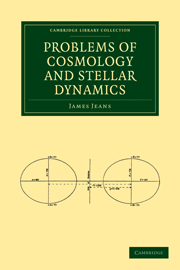Book contents
- Frontmatter
- Preface
- Contents
- I Introductory Chapter
- II General Dynamical Principles
- III Ellipsoidal Configurations of Equilibrium
- IV The Gravitational Potential of a Distorted Ellipsoid
- V Pear-shaped Configurations of Equilibrium
- VI Motion when there are no Stable Configurations of Equilibrium
- VII The Motion of Compressible and Non-homogeneous Masses
- VIII The Evolution of Gaseous Masses
- IX The Evolution of Rotating Nebulae
- X The Evolution of Star-Clusters
- XI The Evolution of Binary and Multiple Stars
- XII The Origin and Evolution of the Solar System
- Index
- Plate section
I - Introductory Chapter
Published online by Cambridge University Press: 05 October 2010
- Frontmatter
- Preface
- Contents
- I Introductory Chapter
- II General Dynamical Principles
- III Ellipsoidal Configurations of Equilibrium
- IV The Gravitational Potential of a Distorted Ellipsoid
- V Pear-shaped Configurations of Equilibrium
- VI Motion when there are no Stable Configurations of Equilibrium
- VII The Motion of Compressible and Non-homogeneous Masses
- VIII The Evolution of Gaseous Masses
- IX The Evolution of Rotating Nebulae
- X The Evolution of Star-Clusters
- XI The Evolution of Binary and Multiple Stars
- XII The Origin and Evolution of the Solar System
- Index
- Plate section
Summary
SURVEY OF THE PROBLEM
The Solar System
In 1543 Copernicus published his treatise “De Revolutionibus Orbium Coelestium” in which the apparent motion of the planets was explained by the simple hypothesis that they all described orbits about the Sun at rest. Two thirds of a century later, in the early days of 1610, Galileo first observed the satellites of Jupiter revolving around their primary, and so obtained what amounted almost to direct visual proof of the truth of the Copernican system of astronomy. But in verifying Copernicus' solution of one problem, Galileo had opened up another. For it now became clear that there were at least two systems of almost exactly similar formation in the universe, and a philosophic mind could not but conclude that they had probably originated from similar causes, and would be impelled to conjecture as to what those causes might be.
In this way the problem of scientific cosmogony had its origin. To the modern astronomer the problem is much richer, wider- and more definite, in proportion as the mass of observational material within his knowledge is greater than that with which Galileo was acquainted. In the solar system alone, we know that in addition to the eight great planets, there are upwards of 900 minor planets or asteroids, and all these 908- or more bodies shew the same regularity in their motion.
Information
- Type
- Chapter
- Information
- Problems of Cosmology and Stellar Dynamics , pp. 1 - 18Publisher: Cambridge University PressPrint publication year: 2009First published in: 1919
